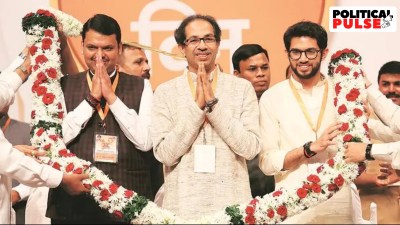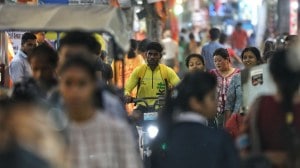- India
- International
Under aegis of lockdown, labour is being shown its place
In the meantime, we the more privileged can comfort ourselves with the soothing platitude — “more wealth must be created before being distributed”. So a five trillion GDP is our goal, not full employment
 Economic performance in India could be enhanced so much by providing productive employment in strengthening local healthcare, education and housing and giving a fillip to farmers with small holdings by creating water management and storage facilities. (File Photo)
Economic performance in India could be enhanced so much by providing productive employment in strengthening local healthcare, education and housing and giving a fillip to farmers with small holdings by creating water management and storage facilities. (File Photo)
A well-known philosophical position claims that the way a question is framed determines whether an answer is possible. After it imposed a severe lockdown at a four-hour’s notice, the government could have used this authoritarian decision to take several drastic steps to reduce the suffering of the poor and those made homeless and jobless so suddenly. The overwhelming need of the hour was to create demand which requires expenditure to precede income, and cash transfers through deficit financing (of around Rs 2 lakh crore). That demand would have sustained some level of production from an under-utilised productive system during the lockdown. The availability of a large stock of food grains through an extended public distribution system would have made the move less inflationary.
Decentralised labour and intensive public works devoted to healthcare, education and housing would have absorbed labour in productive employment through active panchayats and gram sabhas. Kerala pointed to this possibility through its successful battle against COVID-19. Partisanship should not blur facts, and credit must be given when it is due, although the performance of the same political party was pathetic in the three decades it held office in West Bengal.
Economic performance in India could be enhanced so much by providing productive employment in strengthening local healthcare, education and housing and giving a fillip to farmers with small holdings by creating water management and storage facilities. However, this requires, not one way authoritarianism, but sincere decentralisation of power through centre-state agreements — letting gram sabhas compete in terms of their performance, to be rewarded or punished during the next round of funding, irrespective of party affiliation. Growth would then have been the outcome of a vigorous employment policy, and not the other way round.
Opinion | Why abrogation of labour laws is problematic
So why were such steps not taken and not even seriously discussed? The answer lies in a recurring theme in political economy, namely, how unemployment keeps workers in line. For 19th-century masters like Thomas Robert Malthus and David Ricardo, it was almost automatic. Wages above subsistence result in the high growth of population which soon overtakes food production bringing wages back again to subsistence levels. Marx dissented. He pointed out how labour saving technology under capitalism continuously recreates a reserve army of unemployed labour to anchor wage to subsistence levels. Capitalist development did not follow this trajectory, and wages rose with labour productivity in advanced capitalist countries, particularly in the 20th-century. However, full employment, with rising wages, erodes the very discipline which capitalists want to impose on workers, and when neither side gives in, it results in inflation.
In developing countries, things seem rather different. Industrialisation has given rise to a vast informal economy. Notwithstanding 70 years of industrialisation, in India, nearly 92 per cent of the working population is still employed in the informal economy. They exist at the margins of the organised capitalist industry with much lower earnings per hour, long hours of work and no social security. This population is often self-employed with the whole family, rather than one individual, working to eke out a living. Well-funded academic research, the IMF, the World Bank as well as the corporate-fed media all join in a chorus to argue for pro-market reforms, privatisation, and labour market flexibility as if higher growth alone can solve the problem. But, a crucial part of the history of industrialisation of the West needs to be remembered. During the long and tortuous process of transfer of labour from agriculture to industry, democracy with universal adult franchise was hardly in place. Britain took approximately 120 years, the United States about 90, and countries like Germany no less than 60 years. Those early industrialising countries also had colonies to acquire cheap raw materials from, and to sell their products to. This avenue is not available to a late industrialiser like India.

Reform for higher growth alone subverts the neutral role of the state, which needs to act like a fair umpire. This is the essence of a democratic state, regulating the excesses of not only workers, but also capitalists. Instead, imposition of a one-sided discipline, only on workers, has increasingly become the rule of the game under the cover of the pandemic. Our liberalisation has been led by corporations, and not the government which has increasingly taken up the role of a promoter of corporations. Under the convenient cloak of a lockdown, the government is applying this pro-corporate logic even more ruthlessly. It no longer even pretends to act as a neutral referee. Labour is being shown its place as labour protection laws are deregulated and small peasants and agricultural labourers are made to feel more insecure with the threat of monetisation of land for easy transfer to private industry and mining. Millions of tonnes of food grains in reserve will be allowed to rot and eaten by rats, but will not be given free to the unemployed migrant workers.
Opinion | Dalitality: Labour laws and the muffled voices of 93%
Although the lockdown was meant to better prepare the healthcare system to cope up with the pandemic, even temporary nationalisation of basic healthcare services in private hospitals has been kept out of the policy agenda, and there is not even a whisper about taxing wealth to expand health services immediately. All thoughts of a full employment policy have been banished from policy discussion, unemployment and destitution have been allowed to grow without bounds. All this must not be mistaken as just maintaining “a reserve army of labour” to weaken the wage bargaining power of workers. It is meant to show labour its place in our economic and social hierarchy. In the meantime, we the more privileged can comfort ourselves with the soothing platitude — “more wealth must be created before being distributed”. So a five trillion GDP is our goal, not full employment.
This article first appeared in the print edition on July 7, 2020 under the title “The insecure worker”. The writer is former emeritus professor, JNU
Opinion | Ordinances by states to change labour laws are a travesty
EXPRESS OPINION
More Explained
Apr 20: Latest News
- 01
- 02
- 03
- 04
- 05









































